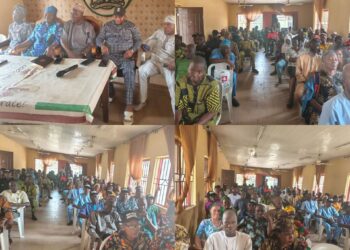Since assuming office in 2019, Governor Seyi Makinde has redefined governance in Oyo State with a pragmatic, data-driven, and people-focused agenda. One of the strongest pillars of his administration has been the deliberate investment in agribusiness, with the goal of transforming agriculture from a subsistence activity into a profitable, sustainable engine for economic growth, food security, and youth employment.

In six years, agribusiness has emerged not just as a policy priority, but as a dynamic tool for inclusive development across the state. Below is a comprehensive overview of the governor’s strategic interventions and achievements in this sector.
1. Establishment of the Oyo State Agribusiness Development Agency (OYSADA)

Governor Makinde established OYSADA in April 2020 as the central coordinating agency for agribusiness development. This agency serves as the brainbox behind the design and implementation of strategic agricultural programs, working in close alignment with both public and private stakeholders.


OYSADA relocated its operational headquarters to Saki, in Oke Ogun, signaling a major decentralization effort and commitment to rural development.
2. Agro-Industrial Hub Development (Fashola Agribusiness Industrial Hub)

The Fashola Agribusiness Industrial Hub in Oyo West LGA is one of the flagship projects under Governor Makinde’s administration. It was developed to attract both local and international agribusiness investors. The hub features:

Access to thousands of hectares of arable land; Road and electricity infrastructure; Processing and storage facilities; Leasing opportunities for private sector-led farming
This development has created jobs, boosted commercial agriculture, and enhanced value-chain integration for crops like maize, cassava, and soybeans.
3. Revitalization of Farm Settlements and Agricultural Infrastructure
The Makinde-led administration has worked on reviving old farm settlements into modern farm estates with better access roads, solar-powered water systems, storage facilities, and extension services. Key examples include:
✓Akufo and Eruwa Farm Settlements
✓Road rehabilitation in farm zones such as Moniya-Ijaiye-Iseyin, Oyo-Iseyin, and others to ease the transportation of farm produce
4. Youth Empowerment Through Agribusiness
Through programs like YEAP (Youth Entrepreneurship in Agribusiness Project), thousands of young people have been trained in agricultural production, processing, and business skills. The governor’s vision is to replace the ageing farming population with skilled youth who see agriculture as a business, not a burden.
Other youth-centered initiatives include:
✓Support for Start Them Early Program (STEP) in partnership with IITA
✓Access to land, funding, and input support for young agripreneurs
✓Vocational training and incubation centers across the zones
5. Public-Private Partnerships and Investments
Governor Makinde’s open governance and ease-of-doing-business policies have attracted both international and local investors to the agribusiness space. Strategic partnerships include:
✓Collaborations with the International Institute of Tropical Agriculture (IITA)
✓Engagements with AFEX, AgroPark, and other agritech firms
✓EU, World Bank, and private sector investments in processing and commodity value chains
6. Access to Finance and Inputs for Farmers
The administration has facilitated improved access to finance for smallholder farmers through:
✓Partnership with CBN Anchor Borrowers Program
✓Input subsidy schemes for fertilizers, seedlings, and mechanization
✓Training on climate-smart agriculture and good agricultural practices
Thousands of farmers have now scaled their production with increased productivity and profit margins.
7. Food Security and Local Economic Development
Makinde’s agribusiness strategy has contributed significantly to the state’s food security by:
✓Encouraging local production of rice, cassava, maize, tomatoes, and livestock
✓Reducing post-harvest losses through better storage and processing infrastructure
✓Empowering rural communities economically through cooperative farming and job creation
8. IITA-Oyo Agribusiness Incubation and Innovation Hub
Located in Awe, the IITA-Oyo State Agribusiness Incubation Hub serves as a research and training ground for modern farming practices and agritech. Youths are trained in value addition, post-harvest processing, and agricultural business modeling.
9. Impact on GDP and Internal Revenue
According to recent data, Oyo State has seen a notable rise in its agricultural contribution to GDP and internally generated revenue (IGR). This has been largely attributed to:
✓Structured agribusiness investments
✓Formalization of agricultural trade
✓Export potential in cash crops and processed foods
Governor Seyi Makinde’s bold vision and unrelenting commitment to agribusiness have turned Oyo State into a beacon of agricultural renaissance in Nigeria. With sustainability, youth inclusion, and private sector collaboration at the heart of his policy, the last six years stand as a testament to what focused leadership can achieve.
As a proud member of the GSM Advocates, I salute this transformational journey that is securing livelihoods today and sowing prosperity for tomorrow.
By Ifeoluwa Ayodele Ogunlola
Member, GSM Advocate


You can get every of our news as soon as they drop on WhatsApp ...To get all news updates, Join our WhatsApp Group (Click Here)
















